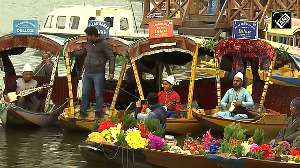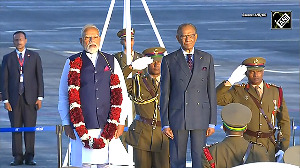As Delhi grapples with water crisis amid the unrelenting summer heat, the Supreme Court on Monday ordered an emergent meeting of the Upper Yamuna River Board on June 5 to address the issue.

The UYRB was set up in 1995 with one of its main functions being to regulate the allocation of available flows amongst the beneficiary states and also monitor and review the progress of all projects up to and including Okhla barrage in Delhi.
The states include Uttar Pradesh, Haryana, Rajasthan, Himachal Pradesh and the National Capital Territory of Delhi.
"Why can't there be a joint meeting of all the stakeholders?" a vacation bench of Justices PK Mishra and KV Viswanathan asked at the outset.
Solicitor General Tushar Mehta, appearing for the Centre and the Haryana government, said the issue was already being considered by the UYRB where all stakeholder states including Himachal Pradesh, Haryana and Delhi are parties.
"This is the question which is being considered. Himachal Pradesh is called upon by the board to provide the details as to what is the extra water or additional water if at all they have," he said.
The bench observed that as an emergency measure, the meeting of the board may be convened on Tuesday to address the issue.
It noted that the advocates appearing for the Centre and the governments of Delhi, Haryana and Himachal Pradesh have agreed that a meeting of the UYRB be held.
The bench was hearing a plea filed by the Delhi government seeking a direction to Haryana to release the surplus water provided by Himachal Pradesh to the national capital to mitigate its water crisis.
"In the course of hearing, all the parties agreed that there should be a non-adversarial approach to the problem of scarcity of water faced by the citizens of Delhi," the bench said.
It said the lawyers have "agreed that there shall be an emergent meeting of the Upper Yamuna River Board on June 5 to address the issues agitated in this petition and all other connected issues in right earnest so that the problem of scarcity of water for the citizens of Delhi shall be properly addressed".
The bench said the matter be posted for hearing on June 6 along with the minutes of the meeting of the board and the suggested steps to be taken by the stakeholders to solve the problem.
Mehta said as per the figures placed before the board, if 100 litres of water comes to Delhi, the residents get only 48.65 litres.
"Total water loss is 51.35 percent," he said, adding that though the residents don't misutilise water, there are leakages, tanker mafia and theft by some industrial units.
Mehta said the Delhi government will have to tighten up the strings.
"You will make that point but not release water in June," senior advocate Abhishek Singhvi, appearing for Delhi government, said.
Singhvi said the Delhi government was making plans for preventing wastage of water.
"What solicitor is saying is also correct that there should be no wastage of water," the bench observed.
When the bench said the board's meeting can be convened on Tuesday, Mehta responded tomorrow it may be difficult.
"Tomorrow, there will be too much of heat," the bench observed. The counting of votes polled in the Lok Sabha elections is scheduled for Tuesday.
"As far as Himachal Pradesh is concerned, whatever unutilised water we have, we are ready to provide," the counsel appearing for Himachal Pradesh told the bench.
During the hearing, Singhvi said, "I come from Rajasthan. The highest I have seen in Rajasthan is 50 (degrees Celsius). I never heard of 52 (degrees Celsius) in Delhi. I have been in Delhi for a long time."
The plea filed by Delhi's Water Minister Atishi has made the Centre, the BJP-governed Haryana and the Congress-ruled Himachal Pradesh parties to the petition, saying that access to water is essential for survival and is one of the basic human rights.
"Access to water is one of the basic human rights of an individual. Not only is water essential for sustenance, but access to water also forms an essential component of the guarantee of dignity and a quality of life guaranteed under Article 21 of the Constitution," the plea said.
"The current water crisis, which may only get worse given peak summers and ongoing water shortage, violates the right to a dignified and quality life of the people of the NCT of Delhi, who are unable to access even adequate clean drinking water," it added.
The plea has sought a direction to the Haryana government for immediate and continuous release of water at the Wazirabad barrage, including but not limited to the full surplus water provided by Himachal Pradesh in order to mitigate the water crisis in the NCT of Delhi.
It said it has sought the direction as a one-time measure and not filed the plea for resolving any outstanding inter-state water dispute.
In order to deal with the demand in summer months, the Delhi government has devised a solution under which Himachal Pradesh has agreed to share its surplus water with Delhi, the petition said.
"Since Himachal Pradesh does not share boundary with Delhi, the surplus water released by it has to be transported through the existing water channels in Haryana and released to Delhi at the Wazirabad barrage," it said.
The national capital has been facing a severe water shortage and Atishi has accused Haryana of not releasing Delhi's share of water.











 © 2025
© 2025